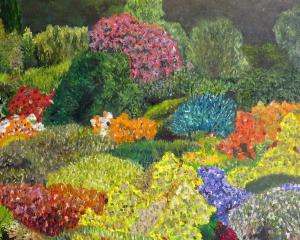Coming to terms with writing fiction is difficult for an academic, especially one versed in literature, as Anna Smith is.
The author of a novel, Politics 101 (2006), and a lecturer in English at Canterbury University, she finished her residency as writer-in-residence at the Caselberg Trust house at Broad Bay, Dunedin, in December.
During her three-month residency, she edited a collection of her short stories, which she hopes will be good enough to be published.
"You have to persuade yourself you should be writing, despite the thousands of words in bookshops already that are far superior to yours. I think it's a bit of a barrier for many academics to write fiction because they are so aware of the perfect sentence," she says.
There is also the necessity to get past the irony of everything you read and write.
"Irony is the perfect kind of self-judgement, sceptical judgement. It's like a splitting in two.
There is a point in your writing where you have to forget what the critical mind is thinking of this. The most important thing, I suppose, for a writer of fiction is that you really can't self-censor too much," she says.
Dr Smith manages to put aside the critical side of her mind when writing fiction, as opposed to her academic writing and art criticism.
The academic process of thinking, analysis and judgement acts like a grille to prevent fictional characters slipping past, she says.
As a child, she used to write, but stopped when she was a teenager, avoiding writing a confessional diary as many teenagers do.
However, she had a fantasy about being a writer, although she didn't realise how hard it was, she says with a laugh.
"But it came to the point where I felt it was necessary, partly to understand various experiences and partly because I found myself always scribbling on pieces of paper as people do, and I wanted to do more with it rather than just let those gather."
Politics 101 is based on Dr Smith's experience as a student involved in politics at Victoria University in the 1970s.
"I think I began with my own experience, wanting to understand what it was like for a young person being a student in the 1970s, falling in love, what was the balance between love and politics, and what it was like to be a thinking young person in New Zealand in the 1970s."
For years she had puzzled over why she had been politically active in student life but gave up politics when she left university.
"It seemed an odd juxtaposition and I wrote partly to revisit that and see how it could have happened, but I don't know that I got any answers, really," she says.
"But what happened is that even though I started writing something that felt close to my experience, it quickly evolved into something else. It's not just a disavowal when writers say that. I think it genuinely happens.
"You can't write for more than five minutes before realising that fiction itself, or language, or whatever people want to call it, has run away with your plot. It's almost like it very quickly becomes a parallel world."
She felt she had to learn to write again as an adult, especially when she was told her first draft read like a novel for teenagers.
"I got a bit affronted, not because it was a wrong judgement, but I realised I'd pitched my writing not exactly where I thought I was pitching it. Then I wrote it again and it was much steelier and more resolved emotionally, even though all of my characters have various kinds of disorders or obsessions."
After Politics 101 was published, Dr Smith realised she still had much to learn about writing and set to acquiring other skills and strategies.
"I also felt for a long time after that novel came out I didn't have enough mental space. I'd just started teaching new courses in children's literature and I'd got up a new course with a colleague called "Cultures of the supernatural".
"All those things took a lot of that front part of my mind and mostly what seemed to happen was I would procrastinate getting down to my fiction and I'd feel anxious about it. Each summer I'd pick it up again and write consistently, then go back to work and I wouldn't be able to sustain it."
When the opportunity to apply for the Caselberg Trust residency came up, she realised three months was an ideal time for her to test herself and see how much she could do and achieve some realistic goals.
She came to Dunedin in early October after finishing teaching at Canterbury University, but she still had to mark exams and supervise her students, which she did in the afternoons, allowing her to devote the mornings to her own work.
She has temporarily abandoned a couple of gothic pieces of work started a few years ago to work on something more realistic.
"There's a turn I've noted in quite a bit of my writing. I like the uncanniness of not knowing whether somebody is suffering an illusion or genuinely experiencing the mysterious.
"If I could get that uneasy poise in my work, even if many people didn't like it or read it - if I knew I could do that, I'd be satisfied," she says.
The trust
The Caselberg Trust bought the Broad Bay, Dunedin, home of the late John and Anna Caselberg in 2006, with the aim of hosting creative residencies in the house, which was also a former holiday home of Charles Brasch.
The residency is offered on an annual basis for a period of between three and six months. It is open to people residing in New Zealand and, from next year, pays a stipend of $6000 for the successful applicant. www.caselbergtrust.org












